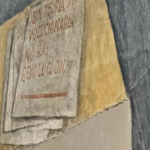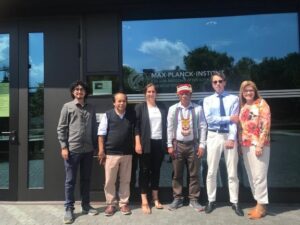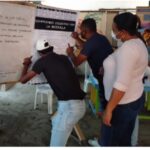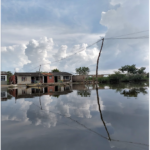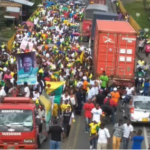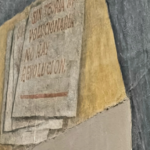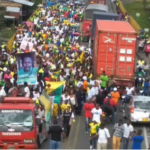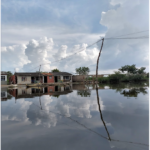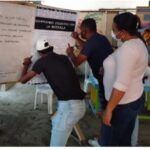Deutsch
Wichtige Stimmen der Rechtswissenschaft des ‚globalen Nordens‘ rufen nach einer Neuausrichtung der Rechtsvergleichung, die just jenen Fokus überwindet. Die Forschung am MPIL macht das seit Jahrzehnten, und das auf einem eigenen Weg: außerhalb des dominierenden angloamerikanischen Rahmens, mit und nicht über Lateinamerika, auf portugiesische und spanische, nicht englische Publikationen zielend, Rechtsvergleichung und Völkerrecht verbindend, konstruktiv und nach vorne schauend.
Die Kooperation reicht über ein halbes Jahrhundert zurück. 1961 organisierte das MPIL eine erste rechtsvergleichende Nachkriegsbilanz über die Entwicklung der Verfassungsgerichtsbarkeit. Leopoldo Uprimny Rosenfeld repräsentierte Lateinamerika. Die kolumbianische Forschung erinnert bis heute die Impulse, die Uprimny aus den Diskussionen mitbrachte: Stärkung des Vorrangs der Verfassung sowie Einführung von Verfassungsgerichten und Ombudspersonen.[1] Das sind heute Bausteine des kolumbianischen Konstitutionalismus, der seit 1991 mit einem der weltweit sichtbarsten Verfassungsgerichte operiert.
Seit den 1980er Jahren arbeiteten viele Doktoranden des Lateinamerikaexperten Dieter Nohlen in der Institutsbibliothek, zumeist zu Fragen demokratischer Transition. Viele davon wirkten später segensreich, etwa Mario Fernández Baeza als chilenischer Innenminister unter Michelle Bachelet. Das von Nohlen 2002 initiierte Heidelberg Center Lateinamerika in Santiago de Chile war das erste deutsche Postgraduiertenzentrum in der Region und wurde maßgeblich vom MPIL bespielt, organisiert von Rüdiger Wolfrum, Rainer Grote und Matthias Hartwig.
Die Gründung des Coloquio Iberoamericano 2004
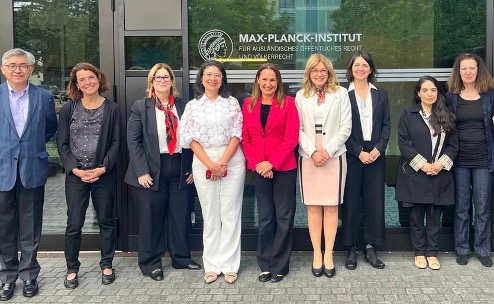
IACHR, IACtHR und Expertinnen im Interamerikanischen Seminar, 3.–5. Juli 2023 (Foto: MPIL)
Anfang 2004 schlugen die zu Lateinamerika forschenden María Pía Carazo, Álvaro De Elena, Maribel González, Henry Jiménez, Andrés Jouannet, Daniel Klein, Mariela Morales Antoniazzi, Lorena Ossio, José Reynoso, Ana María Suárez, sowie Sara Wolf unter Federführung von Richard Ortiz Ortiz, jetzt Richter am Verfassungsgericht von Ecuador, Armin von Bogdandy vor, ein auf Spanisch arbeitendes Coloquio Iberoamericano ins Leben zu rufen, das sie am 5. Februar 2004 gründeten. Organisiert von Mariela Morales Antoniazzi hat es bis Ende 2024 312-mal getagt und über 1500 Wissenschaftlerinnen und Wissenschaftler ins Gespräch gebracht, manche von der Universität Speyer, dank Karl-Peter Sommermann. Ab 2006 traten Konferenzen hinzu, für die Forschende aus der Region zum Institut reisten. Die meisten Debatten des Coloquio, wie der Konferenzen, wollten demokratische Verfassungsstaatlichkeit in Lateinamerika voranbringen. Dank der Arbeiten des MPIL zu Transitionsprozessen in Mittel- und Osteuropa war die interkontinental vergleichende Perspektive von Anfang an vertreten.
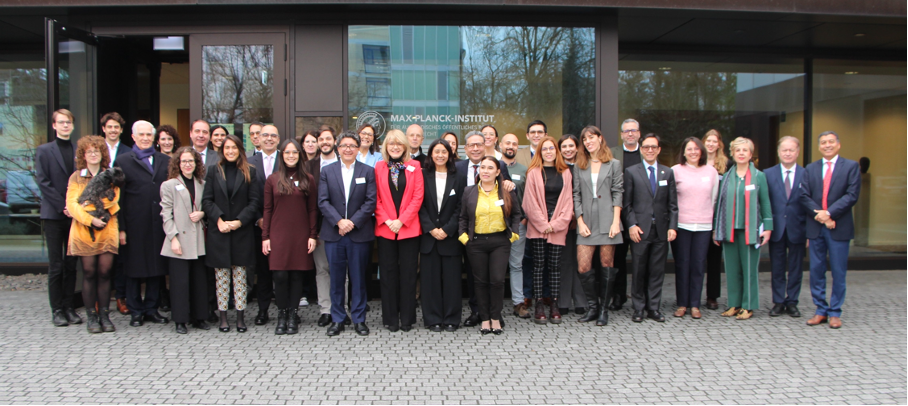
Seminar anlässlich des 20. Jubiläums des Ibero-Amerikanischen Kolloquiums am 26. und 27. Februar 2024 (Foto: MPIL)
Das sich dank Mariela Morales Antoniazzi entwickelnde gemeinsame Nachdenken gewann alsbald an Aufmerksamkeit. So kam 2009 Jorge Carpizo ins Institut. Carpizo, zuvor Rektor der Universidad Nacional de Mexico (UNAM), Präsident der nationalen Menschenrechtskommission, sowie Secretario de Gobernación (Innenminister) unter dem demokratisierenden Präsidenten Salinas, war eine Schlüsselfigur der lateinamerikanischen Rechtsvergleichung, welche die Demokratisierung der Region unterstützte. Seine öffentliche Wertschätzung und Unterstützung der Institutsarbeit eröffnete dem MPIL einen völlig neuen Raum der wissenschaftlichen Kooperation.
Der rote Faden: Das Ius Constitutionale Commune en América Latina
- Kolloquium mit Luis Almagro, Generalsekretär der OAS, 24. April 2018 (Foto: MPIL)
- Luis Almagro, Mariela Morales, Armin von Bogdandy (Foto: MPIL)
Begriffliche Konturen gewann dieser Raum am 19. September 2012. Das Instituto de Investigaciones Jurídicas der UNAM, das größte juristische Forschungsinstitut Lateinamerikas, hatte zu einer Konferenz unter dem Thema „Hacia un nuevo derecho público en el sigo XXI“ geladen. Juristinnen und Juristen aus diversen Ländern präsentierten deren jeweilige nationale Wege demokratischer Verfassungsstaatlichkeit, inmitten der gewaltigen Herausforderungen lateinamerikanischer Gesellschaften. Armin von Bogdandy, der als letzter zu sprechen hatte, artikulierte sodann die Notwendigkeit einer Verbegrifflichung des zuvor Gesagten, unter Zeugenschaft des Freskos, unter dem alle saßen.
- Details des Freskos (Foto: MPIL)
Die Idee lautete, den roten Faden zwischen den Beiträgen als ein Ius Constitutionale Commune en América Latina (ICCAL) zu fassen. ICCAL entstand also als ein analytisches Konzept. Es benennt die Übereinstimmungen der Vorredner im juristischen Denken (also die Theorien, dogmatischen Figuren, als kanonisch betrachteten Entscheidungen, Wirklichkeitsverständnisse) sowie in der von ihnen empfohlenen Praxis (Identifizierung und Aufbereitung von passenden Fällen, Strategien der Prozessführung oder politischen Absicherung). Dieses Denken und diese Praxis begegnen verfassungsrechtlich unhaltbaren Zuständen in der Region mit einer ganz eigenen Kombination aus Verfassungsinterpretation, Verfassungsvergleichung und Menschenrechten. Für die genauere Fassung von ICCALs Stoßrichtung lautete der Vorschlag, den Begriff des transformativen Konstitutionalismus zu nutzen. Dem lag ein Süd-Süd-Vergleich zugrunde, denn der Begriff entstand für die Arbeit des südafrikanischen Verfassungsgerichts der 1990er Jahre.
Vom transformativen Konstitutionalismus zu den communities of practice

20-jähriges Jubiläum des Iberoamerikanischen Kolloquiums am MPIL mit Diego Valadés, Präsident IIDC und Eduardo Ferrer Mac-Gregor, IACtH-Richter, 26.–27. Februar 2024 (Foto: MPIL)
Der wesentliche Unterschied des kolumbianischen, südafrikanischen oder interamerikanischen Gerichtshofs zu einem aktiven Verfassungsgericht wie dem Bundesverfassungsgericht besteht darin, dass deren Rechtsprechung systemisch unhaltbare Zustände angeht und systemischen Wandel verlangt. Der wesentliche Unterschied zwischen dem südafrikanischen und dem lateinamerikanischen transformativen Konstitutionalismus liegt hingegen darin, dass der lateinamerikanische Konstitutionalismus ein regionales Phänomen ist, gestützt von einem regionalen System, das sich der transformativen Agenda verschrieben hat, und einer entsprechenden Rechtsvergleichung. Es ist just die Rechtsvergleichung, welche das, unter anderem von Carpizo gegründete, Iberoamerikanische Institut für Verfassungsrecht seit 1974 verfolgt. Unter der Präsidentschaft von Diego Valadés wurde das MPIL 2014 zu dessen deutscher Sektion.
Diese Begriffsbildung fand eine erfreuliche Aufnahme. Ähnliches gilt für den später gemeinsam mit René Uruena geprägten Begriff communities of pratice, der das Operieren dieser Gruppe näher erläutert. Auch der Begriff des transformative impact, der die soziale Macht dieses Konstitutionalismus trotz schlechter compliance mit einschlägigen Gerichtsurteilen zeigt, fand alsbald Eingang in die Diskussion. Selbiges gilt für den von Mariela Morales Antoniazzi geprägten Begriff der interamericanización, welcher den Einfluss der Interamerikanischen Rechtsprechung auf die nationalen Rechtsordnungen artikuliert. Inzwischen wird das Konzept des ICCAL in eigenen Kursen unterrichtet, was das MPIL mit virtuellem Lehrmaterial unterstützt.
Das Institut als Forum
Das MPIL wird von vielen lateinamerikanischen Kolleginnen und Kollegen als ein besonderes Forum des rechtswissenschaftlichen Austauschs geschätzt, das in dieser Form in Lateinamerika selbst nicht existiert. Viele Protagonisten sind deshalb nach Heidelberg gekommen: aktive Richter und Gerichtspräsidenten der nationalen obersten Gerichte und Verfassungsgerichte von Argentinien, Brasilien, Chile, Costa Rica, Ecuador, Guatemala, Kolumbien, Mexiko und Peru, ebenso wie Mitglieder des Interamerikanischen Gerichtshofs, darunter mehrere seiner Präsidenten. Zu nennen sind hier insbesondere Roberto Caldas, Eduardo Ferrer Mac Gregor, Sergio García Ramírez, Nancy Hernández, Cecilia Medina, Ricardo Pérez Manrique und Humberto Sierra Porto.
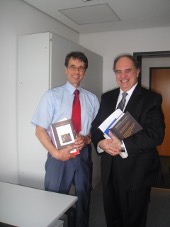
Kolloquium mit Antônio Augusto Cançado Trindade, ehemaliger IGH-Richter, am 23. Juni 2011 (Foto: MPIL)
Auch Persönlichkeiten wie Antônio Augusto Cançado Trindade vom Internationalen Gerichtshof sowie Socorro Flores Liera und Luz del Carmen Ibáñez Carranza vom Internationalen Strafgerichtshof fanden den Weg ans Institut. Unter den Besuchern waren außerdem Minister wie Cesar Landa aus Peru sowie Antonia Urrejola und Alberto van Klaveren aus Chile, sowie der Generalsekretär der Organisation Amerikanischer Staaten (OAS) Luis Almagro. Außerdem kamen Kommissare der Interamerikanischen Kommission, wie deren Präsidentinnen und Präsidenten Esmeralda Arosemena, Francisco Eguiguren, Joel Hernández, Julissa Mantilla und Antonia Urrejola, sowie Vize-Präsidentin Flavia Piovesan und Vertreter indigener Völker, wie etwa der Achuar und der Wampis. Ebenso nahmen prominente Organisationen und Akteure teil, die unhaltbare Zustände durch Rechtsfälle sichtbar machen und so den „Sauerstoff“ für ICCAL liefern, darunter Viviana Krsticevic, geschäftsführende Direktorin des Centro por la Justicia y el Derecho Internacional (CEJIL) und Katya Salazar, geschäftsführende Direktorin der Due Process of Law Foundation (DPLF).

Masterclass mit Manuel José Cepeda im September 2018 (Foto: MPIL)
Manuel José Cepeda, eine der prägenden Figuren des kolumbianischen Konstitutionalismus und Berater im Friedensprozess, für welchen der kolumbianische Präsidenten Juan Manuel Santos 2016 den Friedensnobelpreis erhielt, hielt 2018 die MPIL Masterclass unter dem Titel Transformative Constitutionalism: The Example of Colombia. Die Ideen aus Lateinamerika haben zudem die Forschung am Institut zu Europa nachhaltig geprägt, etwa im Rahmen des Projekts Transition 2.0.
Die Gründung des ICCAL-LAB
- Afro-kolumbianische Legalisierung: Annahme eines lokalen Gesellschaftsvertrags für La Boquilla in Cartagena
- Afrokolumbianische Gebiete in Cartagena, Kolumbien
- Soziale Bewegungen fordern ihre Rechte in Buenaventura, Kolumbien
2017 machte das MPIL einen weiteren Schritt. Als erstes Institut der Geistes-, Sozial- und Humanwissenschaftlichen Sektion der Max-Planck-Gesellschaft nutzte es ein neues Instrument internationaler Kooperation: die Tandem-Gruppe. Seine Gruppe verband es mit der Universidad de los Andes in Bogotá; Thema war ICCAL „vor Ort“. Dank der Arbeiten dieser Gruppe konnte Carolina Bejarano zeigen, wie afrodeszendente Bevölkerungsgruppen in Cartagena ihre Rechte als ethnische Minderheit verteidigen, und Joaquin Garzon Ähnliches anhand von sozialen Bewegungen in der Hafenstadt Buenaventura.

Joaquín Garzón und Carolina Bejarano
Carolina Bejarano wird eine Schlüsselrolle im ICCAL-LAB zukommen, mit dem das MPIL ab 2025 einen weiteren Schritt der Kooperation machen will. Das LAB, von der MPG großzügig zusätzlich finanziert, soll den Rechtsvergleich zwischen Europa und Lateinamerika auf eine neue Stufe bringen. Jeweils vier Personen (Europa/Lateinamerika/‘Nachwuchs‘/‘Etabliert‘) sollen gemeinsam einen Beitrag über ein Thema demokratischer Resilienz schreiben und dabei Gemeinsamkeiten und Unterschiede zwischen den Rechtskulturen transatlantisch artikulieren. Die offensichtlichen Hürden, die dieses Projekt nehmen muss, sind enorm. Aber solche Risikoforschung zu betreiben gehört zum Auftrag des MPIL. Und der magische Realismus, eingeschrieben in ICCALs DNA, wird helfen.
***
[1] Carlos Restrepo Piedrahita, Tres Ideas Constitucionales: Supremacía de la Constitución, Corte Constitucional, El Ombudsman, Bogotá: Universidad Externado de Colombia, 1978, Conclusiones del II Coloquio sobre jurisdicción constitucional en Iberoamérica, 133-139.
English
Important voices in legal scholarship in the ‘Global North’ are calling for a reorientation of comparative law that overcomes precisely this focus on the ‘Global North’. Research at MPIL has been doing this for decades, developing its own path: outside the dominant Anglo-American framework, with and not about Latin America, aiming for publications mainly in Portuguese and Spanish, not English, combining comparative law and international law, and looking to the future.
The cooperation goes back over half a century. In 1961, MPIL organized its first post-war comparative law review on the development of constitutional jurisdiction. Leopoldo Uprimny Rosenfeld represented Latin America. To this day, Colombian research remembers the impulses that Uprimny brought back from the discussions: strengthening the primacy of the constitution as well as introducing constitutional courts and ombudspersons.[1] Today, these are the building blocks of Colombian constitutionalism, one of the world’s most visible since 1991.
Since the 1980s, many doctoral students of Latin America expert Dieter Nohlen have worked in the institute’s library, mostly on issues of democratic transition. Many of them went on to have a beneficial impact, such as Mario Fernández Baeza, who served as Chilean Minister of the Interior under Michelle Bachelet. The Heidelberg Center Latin America in Santiago de Chile, initiated by Nohlen in 2002, was the first German postgraduate center in the region. Much of its teaching has come from MPIL, organized by Rüdiger Wolfrum, Rainer Grote, and Matthias Hartwig.
The Founding of the Coloquio Iberoamericano 2004

IACHR, IACtHR and experts at the Inter-American Seminar, 3-5 July 2023 (Photo: MPIL)
At the beginning of 2004, María Pía Carazo, Álvaro De Elena, Maribel González, Henry Jiménez, Andrés Jouannet, Daniel Klein, Mariela Morales Antoniazzi, Lorena Ossio, José Reynoso, Ana María Suárez, and Sara Wolf, under the leadership of Richard Ortiz Ortiz, now a judge at the Constitutional Court of Ecuador, proposed to Armin von Bogdandy to set up a Coloquio Iberoamericano working in Spanish. It was founded on February 5, 2004. Organized by Mariela Morales Antoniazzi, it had met, by the end of 2024, 312 times and brought together over 1500 academics. From 2006, MPIL added conferences for which researchers from Latin America travelled to Heidelberg. Most of the debates at the Coloquio and the conferences have aimed to promote democratic constitutionalism in Latin America. Thanks to MPIL’s work on transition processes in Central and Eastern Europe, an intercontinental comparative perspective has been included from the very beginning.

Seminary on the occasion of the 20th anniversary of the Coloquio Iberoamericano, 26 and 27 February 2024 (Photo: MPIL)
The joint reflection that developed thanks to Mariela Morales Antoniazzi soon gained attention. A proof to this was Jorge Carpizo’s first visit in 2009. Carpizo, previously Rector of the Universidad Nacional de Mexico (UNAM), President of the National Human Rights Commission, and Secretario de Gobernación (Minister of the Interior) under the democratizing President Salinas, was a key figure in Latin American comparative law that supported the democratization of the region. His public appreciation and support of the Institute’s work opened up a completely new space of academic cooperation for MPIL.
Common Ground: The Ius Constitutionale Commune en América Latina
- Luis Almagro, Mariela Morales, Armin von Bogdandy (photo: MPIL)
- Colloquium with Luis Almagro, Secretary General of the OAS, 24 April 2018 (photo: MPIL)
This space gained first conceptual contours in 2012. On September 19 that year, the Instituto de Investigaciones Jurídicas of the UNAM, the largest legal research institute in Latin America, hosted a conference entitled “Hacia un nuevo derecho público en el sigo XXI”. Lawyers from various countries presented their respective national paths to democratic constitutionalism in the midst of Latin America’s enormous challenges. Armin von Bogdandy, who was the last to speak, then articulated the need to conceptualize what had previously been said, referring to the fresco under the panel was sitting.
- Details of the fresco (Photo: MPIL)
The idea was to summarize the common thread as an Ius Constitutionale Commune en América Latina (ICCAL). ICCAL thus emerged as an analytical concept. It identifies the similarities of the previous speakers in legal thinking (i.e. their theories and doctrines, the decisions they considered as canonical, their understandings of reality) as well as the similarities in the practice they recommend (e.g. for the identification and preparation of suitable cases as well as strategies of litigation or the gathering of political support). In terms of diciplines, they combined constitutional law, comparative law, and international law, in particular human rights. As for their thrust, they addressed systemic deficiencies, that is constitutionally untenable conditions in the region, such as violence, exclusion, corruption, and that with the specific means of the legal field. For defining ICCAL’s thrust, the proposal was to use the concept of transformative constitutionalism. This was based on a South-South comparison, as the term was coined for the work of the South African Constitutional Court in the 1990s.
From Transformative Constitutionalism to Communities of Practice

20th anniversary of the Ibero-American Colloquium at MPIL with Diego Valadés, President IIDC and Eduardo Ferrer Mac-Gregor, IACtH Judge, 26-27 February 2024 (Photo: MPIL)
The main difference between the Colombian, South African or Inter-American courts and an active constitutional court, such as the German Federal Constitutional Court, is that their jurisprudence addresses systemically untenable conditions and demands systemic change. The key difference between South African and Latin American transformative constitutionalism is that Latin American constitutionalism is a regional phenomenon that rests on two pillars. The first pillar is of in international legal nature, the Interamerican System of Human Rights, the second is comparative law among the countries of the region. This is precisely the comparative law that the Ibero-American Institute of Constitutional Law, founded by Carpizo and others, has been pursuing since 1974. Under the presidency of Diego Valadés, MPIL became its German section in 2014.
The proposal to conceptualize those Latin American developments as a common constitutional law with a transformative thrust was well received. The same applies to the term communities of practice, coined later together with René Uruena, which explains the operations of ICCAL in sociological terms. The concept of transformative impact, which demonstrates the social power of this constitutionalism despite poor compliance with relevant court rulings, also found its way into the discussion. The same applies to the term interamericanización, coined by Mariela Morales Antoniazzi, which articulates the influence of Inter-American jurisprudence on national legal systems. The ICCAL concept is by now taught in separate courses, which MPIL supports with virtual teaching material.
The Institute as a Forum
MPIL is considered by many Latin American colleagues as a productive forum for joint research. Many protagonists have made the long way to Heidelberg: active judges and presidents of the national supreme courts and constitutional courts of Argentina, Brazil, Chile, Colombia, Costa Rica, Ecuador, Guatemala, Mexico and Peru, as well as members of the Inter-American Court of Justice, including several of its presidents. In particular, Roberto Caldas, Eduardo Ferrer Mac Gregor, Sergio García Ramírez, Nancy Hernández, Cecilia Medina, Ricardo Pérez Manrique and Humberto Sierra Porto should be mentioned here.

Colloquium with Antônio Augusto Cançado Trindade, former judge of the ICJ, 23 June 2011 (Photo: MPIL)
Personalities such as Antônio Augusto Cançado Trindade from the International Court of Justice and Socorro Flores Liera and Luz del Carmen Ibáñez Carranza from the International Criminal Court also found their way to MPIL. Other visitors included ministers such as Cesar Landa from Peru and Antonia Urrejola and Alberto van Klaveren from Chile, as well as the Secretary General of the Organization of American States (OAS), Luis Almagro. Commissioners of the Inter-American Commission, such as its Presidents Esmeralda Arosemena, Francisco Eguiguren, Joel Hernández, Julissa Mantilla, Antonia Urrejola and Vice-President Flavia Piovesan, and representatives of indigenous peoples such as the Achuar and the Wampis also attended. Prominent organizations and actors who make untenable conditions visible through legal cases and thus provide the “oxygen” for ICCAL also took part, including Viviana Krsticevic, Executive Director of the Centro por la Justicia y el Derecho Internacional (CEJIL) and Katya Salazar, Executive Director of the Due Process of Law Foundation (DPLF).

Masterclass with Manuel José Cepeda, September 2018 (Photo: MPIL)
Manuel José Cepeda, one of the formative figures of Colombian constitutionalism and advisor in the peace process for which Colombian President Juan Manuel Santos received the Nobel Peace Prize in 2016, held the MPIL Masterclass in 2018 entitled Transformative Constitutionalism: The Example of Colombia. Ideas from Latin America have also had a lasting impact on MPIL’s research on Europe, for example as part of the Transition 2.0 project.
The founding of ICCAL-LAB
- Social movements stand up for their rights in Buenaventura, Colombia
- Afro-Colombian neighbourhoods in Cartagena, Colombia
- Legalisation of Afro-Colombian communities: Social Contract for La Boquilla in Cartagena.
In 2017, MPIL took a further step. It was the first Max Planck institute in the Human Sciences Section to use a new instrument of international cooperation: the Tandem Group. It linked its group with the Universidad de los Andes in Bogotá; the topic was ICCAL ‘on site’. Thanks to the work of this group, Carolina Bejarano was able to show how Afro-descendant population groups in Cartagena defend their rights as an ethnic minority, and Joaquin Garzon was able to do the same on the basis of social movements in the port city of Buenaventura.

Joaquín Garzón and Carolina Bejarano
Carolina Bejarano will play a key role in the ICCAL-LAB, with which MPIL intends to take a further step in research with Latin America from 2025. The LAB, generously funded by the MPG, is intended to take the comparison of law between Europe and Latin America to a new level. Four people (Europe/Latin America/’junior’/’established’) will write a joint article on a topic of democratic resilience, articulating similarities and differences between the legal cultures of Europe and Latin America. The obvious hurdles that this project has to overcome are enormous. But conducting such risky research is part of MPIL’s mission. And Latin America’s magical realism, inscribed in ICCAL’s DNA, will help.
***
[1] Carlos Restrepo Piedrahita, Tres Ideas Constitucionales: Supremacía de la Constitución, Corte Constitucional, El Ombudsman, Bogotá: Universidad Externado de Colombia, 1978, Conclusiones del II Coloquio sobre jurisdicción constitucional en Iberoamérica, 133-139.

Armin von Bogdandy ist Direktor am MPIL.
 Mariela Morales Antoniazzi ist seit 2006 als wissenschaftliche Referentin am MPIL, wo sie das Projekt Ius Constitutionale Commune en América Latina (ICCAL) leitet.
Mariela Morales Antoniazzi ist seit 2006 als wissenschaftliche Referentin am MPIL, wo sie das Projekt Ius Constitutionale Commune en América Latina (ICCAL) leitet.

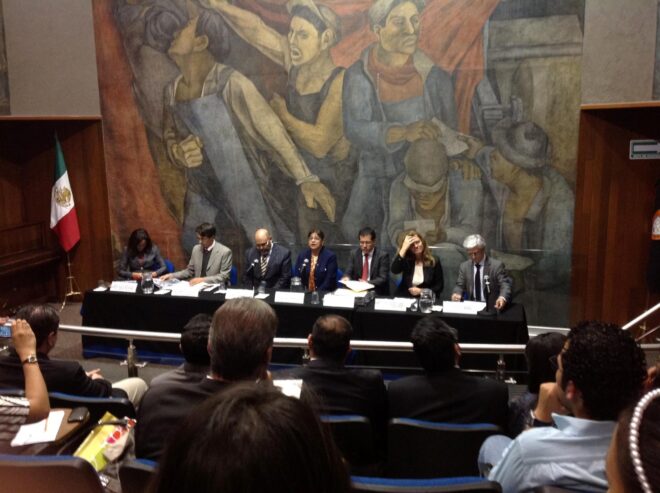 Armin von Bogdandy and experts at the Universidad Autónoma (UNAM) in Mexico, 19 September 2012, Photo: Carlos Reyes (UNAM)
Armin von Bogdandy and experts at the Universidad Autónoma (UNAM) in Mexico, 19 September 2012, Photo: Carlos Reyes (UNAM) 

